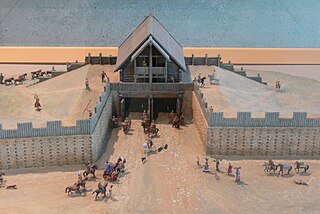
Lusitania was an ancient Iberian Roman province comprising part of modern Portugal and a large portion of western Spain. Romans named the region after the Lusitanians, an Indo-European tribe inhabiting the lands.

Arnedo is the third largest town in La Rioja, Spain. It is located near Calahorra, and has a population of about 15,000 people.

The Trinovantēs or Trinobantes were one of the Celtic tribes of Pre-Roman Britain. Their territory was on the north side of the Thames estuary in current Essex, Hertfordshire and Suffolk, and included lands now located in Greater London. They were bordered to the north by the Iceni, and to the west by the Catuvellauni. Their name possibly derives from the Celtic intensive prefix "tri-" and a second element which was either "nowio" – new, so meaning "very new" in the sense of "newcomers", but possibly with an applied sense of vigor or liveliness ultimately meaning "the very vigorous people". Their capital was Camulodunum, one proposed site of the legendary Camelot.

Hispania Tarraconensis was one of three Roman provinces in Hispania. It encompassed much of the northern, eastern and central territories of modern Spain along with modern northern Portugal. Southern Spain, the region now called Andalusia, was the province of Hispania Baetica. On the Atlantic west lay the province of Lusitania, partially coincident with modern-day Portugal.

Osona is a comarca situated in the central region of Catalonia, Spain. Its capital is Vic. Its population in 2001 was 129,543. Osona covers roughly the same area as the historic Catalan county of Osona. The name Osona comes from Ausetans, a group of Iberian people who had their capital in Ausa ; the Romans called the area Ausone or Ausona. While most of the comarca is within the province of Barcelona, the municipalities of Espinelves, Vidrà and Viladrau form part of the province of Girona.

An oppidum is a large fortified Iron Age settlement or town. Oppida are primarily associated with the Celtic late La Tène culture, emerging during the 2nd and 1st centuries BC, spread across Europe, stretching from Britain and Iberia in the west to the edge of the Hungarian plain in the east. These settlements continued to be used until the Romans conquered Southern and Western Europe. Many subsequently became Roman-era towns and cities, whilst others were abandoned. In regions north of the rivers Danube and Rhine, such as most of Germania, where the populations remained independent from Rome, oppida continued to be used into the 1st century AD.

Faro District is the southernmost district of Portugal. The area is the same as that of the Algarve region. The administrative centre, or district capital, is the city of Faro.

The province of Pesaro and Urbino is a province in the Marche region of Italy. Its capital is the city of Pesaro. It also borders the state of San Marino. The province is surrounded by San Marino and Emilia Romagna in the north, Umbria and Tuscany in the west, Ancona in the south and the Adriatic Sea on the east. The province has an enclave of the Umbrian commune of Citta' di Castello named Monte Ruperto. The province is also known as "Riviera of Hills". It is mostly covered by hills and is popular for its beaches.

The Turduli or Turtuli were an ancient pre-Roman people of the southwestern Iberian Peninsula.

Hispania Ulterior was a Roman province located in Hispania during the Roman Republic, roughly located in Baetica and in the Guadalquivir valley of modern Spain and extending to all of Lusitania and Gallaecia. Its capital was Corduba.

The Bastetani or Bastuli were an ancient Iberian (pre-Roman) people of the Iberian peninsula. They are believed to have spoken the Iberian language. The relationship between the Iberian Bastetani and the Tartessian Mastieni is not entirely clear.

Pre-Islamic Arabia refers to the Arabian Peninsula before the emergence of Islam in 610 CE.

The Peucetians were an Iapygian tribe which inhabited western and central Apulia in classical antiquity.

The Lobetani, were a small pre-Roman Iberian people of ancient Spain mentioned only once by Ptolemy in the 2nd century AD, situated around the mountainous Albarracín area of the southwest Province of Teruel.

The Turboletae or Turboleti were an obscure pre-Roman people from ancient Spain, which lived in the northwest Teruel province since the early 3rd Century BC.

The Turmodigi were a pre-Roman ancient people, later mixed with the Celts people of northern Spain who occupied the area within the Arlanzón and Arlanza river valleys in the 2nd Iron Age.

The Cratistii were an ancient pre-Roman, stock-raising people whose lands were situated along the upper Tagus valley, in the elevated plateau region of the western Cuenca and northeast Province of Teruel.
According to Strabo, the Artabri were an ancient Gallaeci tribe, Celts living in the extreme north-west of the Iberian Peninsula, now the region of Galicia, Spain, about Cape Nerium, outskirts of today's city of Ferrol, where in Roman times, in the 1st century BC, a fishing port existed which also traded in metals as well as wild horses and most likely administered from nearby Nerium in an area dominated by the Artabri) giving name to the Portus Magnus Artabrorum. Strabo reports several seaports among the Artabri. Ptolemy places them among Galaeci Lucenses and gives their capital town as Lucus Augusti.

The Cerretani or Ceretani were ancient pre-Roman people of the Iberian Peninsula who occupied what became the modern-day Cerdanya, in the valley Segre and part of Aragon. Their neighbours from the east were Ausetani and from the south Ilergetes. Their capital was Julia libyca, modern Llívia. They are noted in Greek and Roman geographical treatises.











